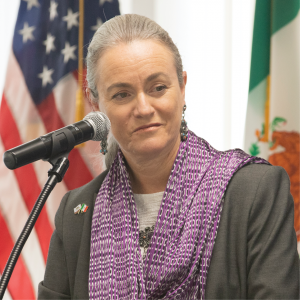On May 3, the California Chamber of Commerce hosted a luncheon for the 13th Annual California Mexico Advocacy Day in conjunction with the Consulate General of Mexico in Sacramento.

The luncheon focused on the future of the bilateral relationship between California and Mexico as the bilateral partners emerge from the global COVID-19 pandemic. The California-Mexico relationship has remained strong, as Mexico continued to be California’s No. 1 export market in 2021.
CalChamber President and CEO Jennifer Barrera welcomed attendees to the luncheon, then turned the podium over to Ambassador Liliana Ferrer, Consul General of Mexico in Sacramento, who spoke about the importance of the bilateral relationship and the long-standing friendship between California and Mexico.

Ambassador Ferrer and speaker Cristina Planter Riebeling, director general of North American affairs with the Mexican Ministry of Foreign Affairs, highlighted the importance of the U.S.-Mexico-Canada Agreement (USMCA) to the economies and relationship between both the U.S. and Mexico, and California and Mexico.
Ambassador Ferrer noted that key provisions of the USMCA relate to the digital economy, intellectual property, regulatory and technical barriers, customs, agriculture and regional supply chains. Cooperation in these strategic areas and others, along with California’s competitive advantages, will enable bilateral trade between Mexico and California to continue growing, the Ambassador said.

Planter pointed out that with the North American Free Trade Agreement (NAFTA) and now the USMCA, the U.S., Mexico and Canada have been finding ways to promote economic growth. It is noteworthy that the estimated regional gross domestic product (GDP) is around $23.6 million, and has contributed to raising the standards of living of the 493 million people living in the three nations, she said.
During the COVID 19 pandemic, the strong ties between the three countries and the depth of their integration were demonstrated, as well as the will to chart a new path for the region, Planter commented.

The upcoming North American Leaders Summit, she said, represents a new stage for the relationship between the USMCA nations. From Mexico’s perspective, she explained, the summit meetings are key not only to advance in the construction of a North American vision in a post-pandemic context, but also to make commitments on priority issues for the governments.
She thanked California for sharing common principles and for being a partner in advancing projects to benefit the region.
The third speaker was Richard Kiy, president and CEO of the Institute of the Americas. He too emphasized the shared interdependence of California and Mexico.
But the relationship goes beyond trade and commerce, Kiy said, noting there are so many issues today that require bilateral cooperation.

He pointed out that the San Diego-Baja region is one of the most dynamic border regions with more than 120,000 passenger vehicles and 63,000 pedestrians crossing the border daily.
Many San Diegans today live in Tijuana because they can’t afford to buy a house in San Diego, Kiy said. Citing a newspaper headline reporting the median price of a house in San Diego exceeding $1 million, Kiy said the reality is that for San Diego businesses to be competitive, Tijuana provides an important outlet for affordable housing.
Kiy said more should be done to take advantage of the close proximity of Mexico and California. Going forward, he said, companies are going to have to really rethink their site relocation decisions. Given the supply chain disruptions faced by many California companies with operations in China, some are looking to bring back facilities closer to home.
Export Statistics
Mexico purchased 15.5% of all California exports in 2021. California exports to Mexico amounted to $27.23 billion in 2021, an increase of 13.22% from 2020. Computers and electronic products remained California’s largest exports, accounting for 17.9% of all California exports to Mexico.
In 2021, California was the second largest exporting state to Mexico and the state with the largest amount of imported goods from Mexico; imports totaled $57.66 billion. Mexico is the 13th largest source of foreign direct investment (FDI) through foreign-owned enterprises (FOEs) in California. In 2020, Mexican FOEs in California provided 13,400 jobs through 472 firms amounting to $1.256 billion in wages.


